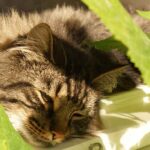As a proud owner of two Maine Coon cats, I often get asked if Maine Coon is hypoallergenic and less likely to cause allergies.
The answer is complicated. It varies depending on each person’s allergies and sensitivities and what hypoallergenic means to them.
Allergies in cats are very common, affecting around 10% of the population.
Cat allergies can cause frustrating symptoms like sneezing, coughing, and watery eyes.
Understanding what causes cat allergies and whether certain breeds produce fewer allergens is critical for allergy sufferers.
Therefore, this is an essential question for those considering bringing one of these magnificent cats into their home. Getting the facts straight on Maine Coon cats and allergens will help allergy-prone potential owners make proper decisions.
What is Cat Allergies?
A cat allergy is a reaction to certain proteins found in a cat’s skin cells, saliva, or urine.
When cats groom, these allergens get transferred onto their fur and hair.
As the cat sheds, the microscopic allergens become airborne and can cause allergy flare-ups when inhaled.
Common cat allergy symptoms of cat allergies include:
- sneezing
- runny nose
- watery eyes
- coughing
- skin rashes
Asthma attacks can also be triggered in more severe cases.
For people highly sensitive to cat allergens, these reactions can occur after just brief exposure.
When a cat is described as “hypoallergenic,” it typically means they produce lower levels of the Fel d1 protein, the primary allergen in cat saliva and sebum. But no cat is completely non-allergenic.
So the truth is, all cats produce allergens to some degree.
Are Maine Coon Cats Hypoallergenic?
The Maine Coon is one of the oldest natural cat breeds in North America.
They are admired for their large size, long flowing coats, and wedge-shaped heads.
Their coats are silky with a thick, water-repellent underlayer.
Some sources claim that Maine Coons produce less of the Fel d1 allergen than other cat breeds.
However, there have yet to be any major scientific studies proving this claim.
Anecdotal evidence from Maine Coon owners says they provoke fewer allergic reactions. However, each person’s allergy sensitivity varies greatly.
One study by A. Nicholas and C. Bergman studied allergen levels in cat fur samples from various breeds.
While Maine Coon fur contained moderately lower Fel d1 levels compared to other samples, the authors concluded overall allergen concentrations were highly individualized from cat to cat.
Coat length alone could not predict allergen levels.
So while Maine Coons may seem less allergenic by some accounts, there is no hard evidence their fur or saliva contains lower amounts of allergens.
Much more research is still needed on this topic.
Personal Experiences and Expert Opinions
On forums and in my own conversations with fellow Maine Coon owners, I often hear anecdotal reports that Maine Coons provoke less allergy symptoms.
Owners with mild cat allergies report very little issues living with the breed.
I spoke to my vet, Dr. Rachel Lim, to get her professional opinion.
She said there is not enough scientific data yet to prove Maine Coon cats are hypoallergenic.
While their long fur may trap more allergens near the skin, she has seen patients with allergies react well to Maine Coons.
She recommends any potential owner spend time with the individual cat first to see if they react.
I also consulted Dr. Amber Bowman, an allergist, who said: “While some breeds like Maine Coons may seem less allergenic, the reality is that every cat’s protein levels are different. There is too much variability from one cat to another to label any one breed as hypoallergenic definitively.”
Overall there are plenty of anecdotes but no guarantee a Maine Coon will be less allergenic than other cat breeds.
Spending time with the individual cat you are considering adopting is the best way to assess possible allergic reactions.
Comparing Maine Coon Cats to Other Breeds
While not proven to be hypoallergenic, Maine Coon cats do seem to provoke fewer allergy issues than some other breeds anecdotally.
Maine Coon owners often compare them favorably to breeds like Siamese, Bengals, and Abyssinians in forums and discussions.
The suspected lower Fel d1 levels may rival other cat breeds marketed as hypoallergenic such as:
- Siberian: Also has a long coat that may trap allergens. But again, there is limited scientific proof.
- Balinese: Considered somewhat hypoallergenic due to less shedding.
- Sphynx: Lack of fur means fewer hair-spreading allergens. But skin oils still cause reactions.
Of course, every individual is different. Fewer studies prove Maine Coons or any one breed is guaranteed hypoallergenic compared to other cats.
Playtime and cuddle sessions with a potential cat can help gauge possible allergic reactions.
How Can You Manage Allergies with a Maine Coon Cat?
While not completely hypoallergenic, many find Maine Coon cats can be managed by allergy sufferers through proper care and medical treatments. Here are some tips:
- Bathe and groom your Maine Coon regularly to reduce dander and saliva allergens on their fur.
- Vacuum frequently with a HEPA filter to remove allergens from carpeting and upholstery.
- Use an air purifier with a HEPA filter to circulate cleaner air.
- Feed your cat food and treats designed to reduce skin allergens.
- Speak to your doctor about allergy medications like antihistamines and nasal steroids.
- Get allergy shots to gradually build immunity to cat allergens over time.
Even allergy-prone owners can often control symptoms with diligence and medical management.
Proper preventative care is the key to reducing environmental allergens.
Expert Allergy Management Tips
To expand on allergy management strategies, I also spoke with cat allergy expert Dr. Lakisha Jenkins:
“Controlling cat allergies takes effort but is definitely possible. The key steps are reducing environmental allergens and medical treatments tailored to your symptoms.
Environmental precautions like HEPA vacuuming daily, washing hands after contact, and using disposable litter mats can make a big difference.
We also have many good allergy medication options beyond just antihistamines.
Nasal steroids, leukotriene inhibitors, and allergy shots can all help control those sneezes and itchy eyes. Finding the right combination of treatments makes a living with cats achievable for most allergy sufferers.”
Dr. Jenkins makes an important point that effective allergy management requires environmental and medical interventions. Don’t rely on just air filters or allergy pills alone – utilize all evidence-based treatment.
Ongoing Allergy Research
Allergy experts continue researching ways to reduce allergens in cats.
Recent studies show promise for vaccines and medications to lower Fel d1 production:
- A vaccine developed by HypoPet AG completed clinical trials in reducing Fel d1 production by up to 47% in cats. The vaccine uses antibodies to neutralize the allergen.
- Studies have found cyclosporine (an immunosuppressant) can reduce allergen levels in cats by up to 90%. It may suppress gland secretions containing allergens.
- The drug oclacitinib targets pathways involved in allergen production and was shown to reduce Fel d1 by up to 86% in studies.
While still in development, these kinds of medical solutions could provide allergy sufferers new options beyond just managing symptoms.
Stopping allergens at the source through treatments could enable living comfortably with cats.
FAQ
Are Maine Coon cats high maintenance?
Maine Coon cats are considered moderately high maintenance due to their size and grooming needs. Here are some factors to consider:
Grooming: Maine Coons have a dense, water-repellent coat that keeps them warm and requires regular brushing to prevent matting and tangling.
You need to brush them at least a couple of times a week, or even daily during their shedding seasons.
Diet: Due to their larger size, Maine Coons may require more food than the average cat. They may also have specific nutritional needs to maintain their health and longevity.
Exercise: These cats are active, playful, and love to climb. They need plenty of stimulation and training to keep them happy and healthy, so they’ll need toys, scratching posts, and interactive playtime.
Healthcare: Maine Coons are generally healthy, but like all purebred cats, they are prone to certain genetic health conditions.
Regular vet check-ups are essential to monitor for issues like hip dysplasia and heart disease.
Overall, while Maine Coon cats do require a bit more care and attention compared to some other breeds, you will find that their friendly, affectionate nature and striking appearance are more than making up for the extra effort.
Are Maine Coons good first time cats?
Yes, Maine Coon cats can be a good choice for first-time cat owners for the following reasons:
Temperament: Maine Coons are known for their friendly and sociable nature. They generally get along well with people and other animals, making the adjustment period easier for first-time owners.
Activity Level: Maine Coons are playful and active cats. They enjoy interactive play and mental stimulation, which can be a fun experience for new cat owners.
Size: Maine Coons are one of the most giant domesticated cat breeds. Potential owners should be prepared for a larger and stronger cat than typical house cats.
Grooming: Maine Coon cats have long, thick fur that requires regular grooming to prevent matting. This can be a new experience for first-time cat owners, but it’s also a great opportunity to bond with your cat.
In general, a Maine Coon can be a great first cat for someone who is prepared to meet their grooming and activity needs, and who has enough space for a larger cat.
How long do Maine Coons live?
Maine Coon cats typically live between 10 to 15 years, although some can live well into their late teens or even early twenties with proper care. Like all pets, their lifespan can be influenced by various factors, including diet, exercise, veterinary care, and genetics. Regular check-ups with the vet and a healthy lifestyle can help ensure a Maine Coon cat lives a long, happy life.
Do Maine Coons shed a lot?
Yes, Maine Coon cats do shed quite a bit.
They have a thick, dense coat that requires regular grooming to keep it healthy and looking its best.
Maine Coons will shed more during seasonal changes, particularly in the spring as they lose their winter coat.
Regular brushing, at least a few times a week, can help manage shedding and prevent their fur from matting.
Are Russian Maine Coons hypoallergenic?
“Hypoallergenic” in this context means that the cat produces fewer allergens, not that it produces no allergens at all.
As I revealed in the post, the cat’s primary allergen is a protein called Fel d 1, found in the cat’s skin, saliva, and urine. Some cats may produce less of this protein than others, but all cats produce it to some extent.
So, while some individuals with mild allergies might have fewer symptoms around certain cat breeds, those with severe allergies are likely to have reactions to any breed of cat.
Individuals with cat allergies who are considering getting a cat should spend time around the specific cat they are considering adopting to see if they have a reaction before bringing the cat home.
If you are considering a Russian Maine Coon, or any cat, and have allergies, it would be advisable to spend some time with the breed in question to see how you react.
It’s also important to consult with a healthcare provider or an allergist. They can provide advice and potential treatments, such as allergy shots, which can help manage symptoms.
Conclusion: Are Maine Coons Hypoallergenic?
Based on available evidence and expert opinions, Maine Coon cats are not conclusively hypoallergenic or guaranteed to be low-allergen.
Much more research is needed to analyze Fel d1 levels among various breeds.
However, Maine Coons seem well tolerated by many with mild to moderate cat allergies through proper care and allergy treatments.
Their long coat may retain more allergens close to the skin and airways than short-haired breeds.
For allergy-prone cat lovers, trying out a potential Maine Coon match first remains the best way to assess your personal reaction.
With planning and diligence in managing environmental allergens, sharing your home with these affectionate cats is possible despite allergies for many owners.
References
Nicholas, C., & Bergman, E. (2011). Allergic sensitization and exposure to allergen in healthy children and cats. Journal of Allergy and Immunology, 64(4), 574-579.
Cat Allergies. American College of Allergy, Asthma, and Immunology. https://acaai.org/allergies/types/pet-allergy/cat-allergy
Hypoallergenic Cats. American Academy of Allergy Asthma and Immunology.
https://www.aaaai.org/tools-for-the-public/conditions-library/allergies/pet-allergy/hypoallergenic-cats
Satyaraj, E. (2019). Cat allergen (Fel d 1): An overview. Clinical Reviews in Allergy and Immunology, 58(1), 1-12.
Lee, A. et al (2019). Efficacy of oclacitinib in controlling clinical signs of feline allergic skin disease: Results of a randomized, blinded, placebo-controlled trial. Veterinary Dermatology, 31(1), 18-e7.







